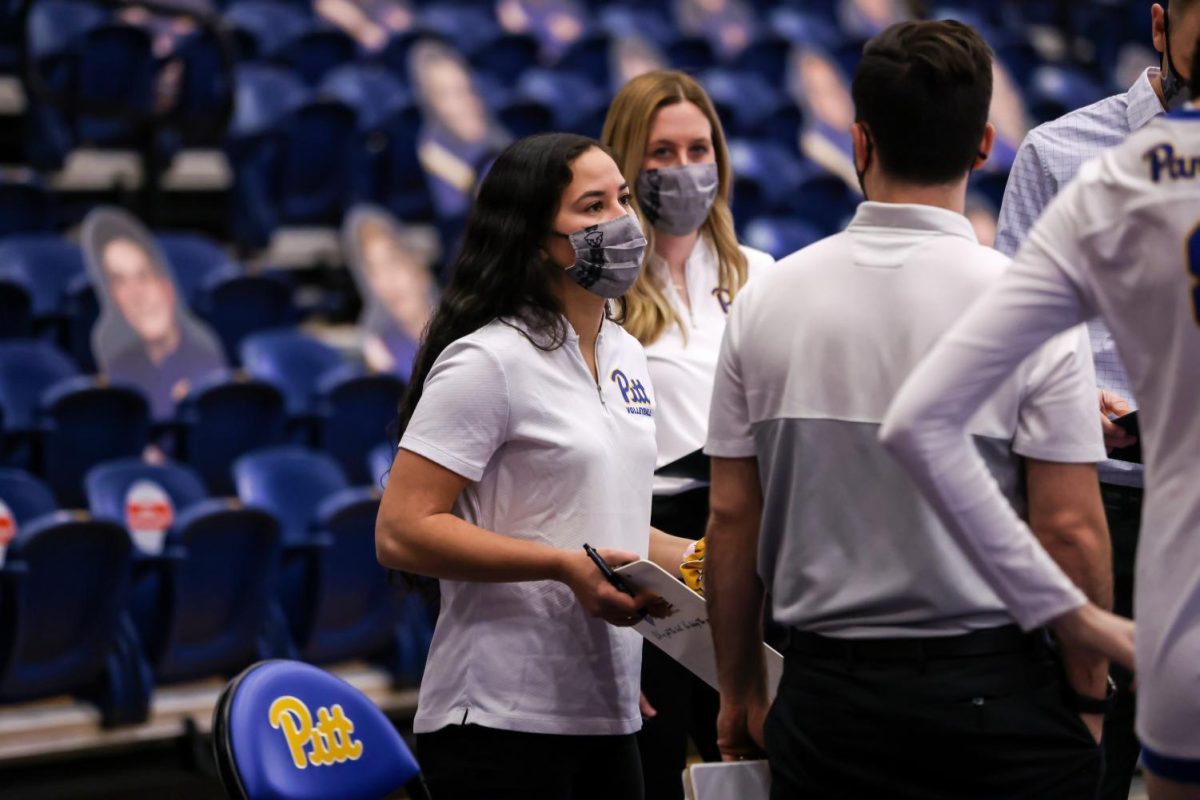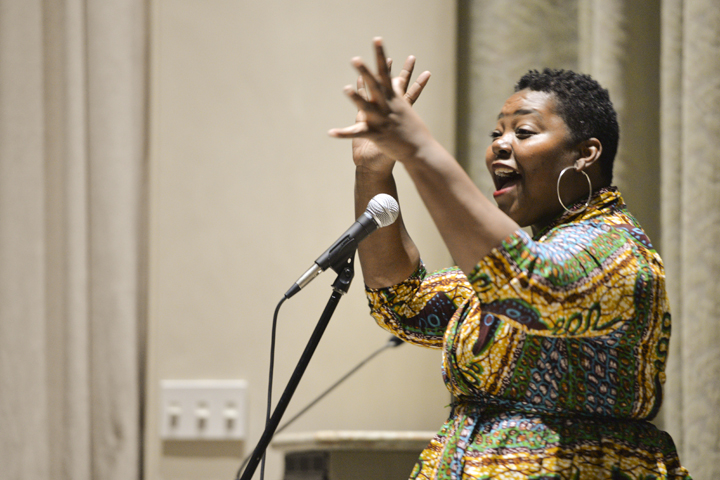Mahogany L. Browne was told in 1998 that the way she spoke wasn’t considered poetry.
Alongside two other poets Thursday evening, Browne shared poems in response to police brutality with a crowd of about 200 people in the Frick Fine Arts Building.
Browne, as well as Amanda Johnston, 39, and Jericho Brown, 40, are the three founders of the Black Poets Speak Out movement. The movement was born from a Tumblr hashtag and serves as “a collective outcry for our black lives,” according to Browne, 40. One of Browne’s readings listed the last names of young, black men killed by cops: Martin, Brown, Bell.
“This country is in dire need of having the hard discussions. So why not Pittsburgh? Why not Oakland? The people of this country are under fire,” Browne said.
So far this year, police in Pennsylvania have shot and killed 16 people: seven white men, seven black men and two men of unknown race.
Nationally, police have shot and killed 824 people in 2016.
“The work of Black Poets Speak Out is international. It is wherever injustice is. It is everywhere,” Johnston said.
Black Poets Speak Out offers an outlet for anyone — regardless of race, gender, age, religion or political leanings — to submit poems and readings to the forum. The Tumblr site guides black and white poets with different instructions for the introduction to their submission. Black Poets Speak Out encourages poets to use hashtags, posts, links and shares to spread their work through social media.
The Center for African-American Poetry and Poetics organized the event. The center’s Assistant Director Lauren Russell, 33, said the event was intended to present students with the concepts surrounding police brutality.
“[The event was] an opportunity for students to engage in ideas that may be more familiar, more comfortable to some than others around police violence, race and Black Lives Matter,” Russell said.
While the event was not planned as a result of Tuesday’s presidential election, the opportunity provided solace to speakers and audience members who have felt distressed since the results came in.
“People in positions of power should challenge people in positions of power,” Mahogany said, quoting Johnston.
Johnston sent a letter to President Barack Obama every day in 2015 asking him what action he was going to take regarding police brutality disproportionately against African-Americans. According to Johnston, he wrote back once, telling her to be patient.
Anna Nelson, a Carnegie Mellon University graduate, said she came to the event wanting to be in “a loving and comforting environment” after Tuesday’s election.
She said she thought the speakers would be more aware of the political atmosphere than other forms of media.
“I was blind a couple of days ago. I came to educate myself and explore different methods of resistance,” Nelson, 24, said.
According to Nelson, the readings were cathartic and tear-inducing.
“I felt like the poets directed the responsibility on white people, on us.”
Nick Marsellas, a Pitt graduate student and instructor in the English department, felt the event called people to “dismantle” systems of oppression, especially when those systems cater to white Americans.
“As a white person, I benefit from white privilege,” Marsellas, 24, said. “[The poems] reinforce the importance of small acts of resistance in the face of a challenge that seems really big.”
Marsellas came to the event in support of his friend and colleague Treviene Harris.
Harris, also a graduate student and instructor in Pitt’s English department, had never heard the poets speak before.
“It was necessary for me personally to be in a black cultural space and to get emotional sustenance,” Harris said.
For Harris, the Black Poets Speak Out message reinforced the purpose of creative work as a path to social justice.
Black Poets Speak Out’s co-founder Brown has been using creative work, specifically poetry, his whole life. It saved him from getting beaten up by his cousins when he wrote raps for them. His mom hung them on the fridge.
As a child, Brown spent time with poetry at his local library while his mother, who couldn’t afford a babysitter, ran errands. The poems attracted him. They were short. He didn’t have to know everything every step of the way.
Eventually, Brown took his love of poetry to the stage, and performance came naturally to him.
“[Growing up in] the black church, kids were expected to do things in front of people all the time,” Brown said.
Despite being named “Mr. Delta Gent” by his fraternity Alpha Phi Alpha, being elected freshman class vice president at Dillard University and reading his work across the world, Brown does not consider himself a performer — or even a performance poet or slam poet.
“I’m a poet,” Brown said. “I would not have ever come out if it weren’t for poetry. I would not have the respect for women I hope I have, if it weren’t for the poems I’ve heard.”
Spending time with Langston Hughes, Maya Angelou, Anne Sexton and Lucille Clifton led Brown to earn his Bachelor of Arts in English from Dillard University, his Master of Fine Arts from the University of New Orleans and his Ph.D. from the University of Houston.
However, love is what matters to him.
“Our love is everywhere and always in abundance. That’s all I really care about,” he said.



